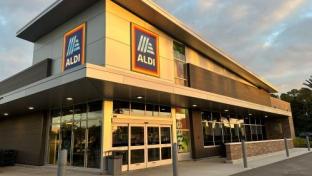PG's 2017 Super 50: In the Hunt
Highest on the list of those grocers determined to crush the competition is Boise, Idaho-based AB Acquisitions LLC (No. 3), parent company of the Albertsons, Safeway and Vons banners, among others across the country.
In the two years since the Albertsons-Safeway merger, the grocer has built 23 ground-up stores and acquired 151 locations. But it hasn’t stopped there — it’s shown interest in acquiring Schenectady, N.Y.-based Golub Corp.’s Price Chopper banner, itself No. 24 on PG’s ranking; Phoenix-based Sprouts Farmers Market (up three spaces from last year, at No. 23); and Whole Foods Market, in Austin Texas (No. 9).
At No. 4, Amsterdam-based Ahold Delhaize, also reinvigorated by its recent merger, is moving swiftly to create a more decentralized merchandising model to better position its regional U.S. banners in their local markets.
As Frans Muller, acting COO of Salisbury, N.C.-based Delhaize America and Kevin Holt, COO of Quincy, Mass.-based Ahold USA explained to PG in February, the company’s brand-centric strategy will enable its regional operating divisions to have distinctive commercial strategies tailored to local markets with dedicated resources, including category merchandising, assortment, pricing, promotions, marketing and format teams. The brand-centric structure is expected to be complete by early 2018.
In addition, Ahold Delhaize’s newly created Retail Business Services divsion will leverage the company’s scale to drive synergies and best practices while providing industry-leading expertise, insights and analytics to its regional banners to support their respective strategies, including commercial and other support services. To that end, a series of executive appointments were made in late April to accelerate a decentralized strategy for better regional expertise.
Publix Super Markets, meanwhile, at No. 5, is moving ahead with its northern invasion, planning to open its first two stores in Virginia, with additional growth slated for its existing footprint of Florida, Georgia, Alabama, Tennessee, South Carolina and North Carolina, and also rebooting the natural/organic GreenWise banner in its home state. The Lakeland, Fla.-based grocer is also building on its partnership with Nemours Children’s Health System by opening two on-campus pharmacies at Nemours facilities so far.
Meijer, clocking in at No. 7, has opened two Indianapolis-area supercenters and introduced home grocery delivery across its entire six-state footprint, through a partnership with Birmingham, Ala.-based Shipt. The Grand Rapids, Mich.-based supercenter retailer’s expansion plans are currently focused on Michigan’s Upper Peninsula, where it’s prepping to debut its first two stores this month.
Batavia, Ill.-based Aldi US, up three notches from last year, at No. 10, has embarked on a $1.6 billion remodeling and expansion program of more than 1,300 of its U.S. stores by 2020 while hewing to an accelerated growth plan to open 650 new locations across the United States, investing more than $3 billion to bring its total to nearly 2,000 supermarkets by the end of 2018. The additional stores and upgrades may place the company in a better position as it braces for the onslaught of fellow German hard-discounter Lidl — a major competitor of Aldi in Europe — starting as early as this summer in Virginia, North Carolina and South Carolina.
Down at Jacksonville, Fla.-based Southeastern Grocers (No. 11), change is in the air in the shape of additional rollouts of the company’s Hispanic-themed Fresco y Más banner in south Florida — a total of 11 are now open — and its refreshed Harveys format in 70-plus locations in Georgia, South Carolina, North Carolina and Florida last year, following the launch of a new Winn-Dixie concept store in its hometown.
No. 13 on the Super 50 list — up two rungs from last year — West Des Moines, Iowa-based Hy-Vee has revealed the restructuring of several corporate departments to grow three key areas — IT, HealthMarkets and restaurant development — and the addition of almost 70 new positions to its corporate staff. This follows the expansion of its corporate headquarters across two locations last autumn. Additionally, the grocer has boosted its presence in Minnesota, where it has operated since 1969, by opening several locations over the past few years in the Twin Cities area.
Coming in at No. 27, West Sacramento, Calif.-based Raley’s has introduced a store concept focused on health and wellness and greater sustainability in its hometown market, with plans to open five more over the next 18 months, as well as rolling out an enhanced version of its eCart click-and-collect program across the Bay Area.
Meanwhile, Sunbury, Pa.-based Weis Markets (No. 28), having undertaken a flurry of acquisitions from Mars Super Markets, Ahold Delhaize’s Food Lion banner and Nell’s Family Market, converted all 44 locations to the Weis banner in just 96 days last fall and grew its store base to 204 locations across seven states. As a result of these new stores, this past March, the company posted a whopping Q4 sales increase of 17.6 percent and noted that in 2016, it generated more than $3 billion in sales for the first time in its 104-year history.
What’s more, earlier this year, the grocer introduced a more experiential store concept on Harrisburg, Pa.’s West Shore that features an ice cream parlor, a pub and adjacent café, a food court, service-focused fresh departments, a drive-thru pharmacy, a fuel center, and online ordering with in-store pickup. And, as this issue went to press, the retailer revealed an ambitious $90 million cap ex plan for the coming year.
SpartanNash, at No. 33, saw fit to grow its wholesale capabilities through the acquisition of Indianapolis-based Caito Foods’ produce distribution and fresh-cut fruit and vegetable businesses, along with its newly constructed Fresh Kitchen facility, designed to process and package fresh-prepared foods, and the logistics business of Caito’s Blue Ribbon Transport operations. According to Dennis Eidson, CEO and chairman of Grand Rapids, Mich.-based SpartanNash, set to be succeeded when he retires this month by COO David Staples, the complementary acquisition “further strengthens our platform and enhances our ability to help our customers serve their consumers, benefiting our associates and the communities we serve.”
K-VA-T Food Stores (No. 34), based in Abingdon, Va., which in 2015 acquired and converted to its Food City banner 29 Bi-Lo stores from Southeastern Grocers, is continuing to hone its stores, as the location that debuted last year in Johnson City, Tenn., and the six revamped stores in the Chattanooga, Tenn., market amply attest. The new and/or improved supermarkets offer such features as state-of-the-art refrigerated cases, an enhanced meat and seafood service area, a fresh food bar, and café seating, as well as an expanded hot bar and pizza case, and a growler station with craft beers on tap.


